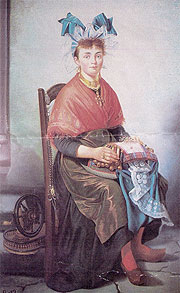Call for papers for Developments in Dress History conference
15 Aug 2013
 Over the last twenty years, dress history has moved from the margins of academic debate to the centre of interdisciplinary analysis in the arts and humanities. Dress and its meanings are matters of significance for social and cultural historians; the circuits of clothing across the globe are used to explain patterns of globalisation; its exchange between people is essential to understandings of consumer culture; everything we wear is understood as a crucial component identities and rituals. Once denigrated by design reformers, fashionable dress is integrated into histories of design and western clothing is considered alongside traditional textiles within studies of material culture.
Over the last twenty years, dress history has moved from the margins of academic debate to the centre of interdisciplinary analysis in the arts and humanities. Dress and its meanings are matters of significance for social and cultural historians; the circuits of clothing across the globe are used to explain patterns of globalisation; its exchange between people is essential to understandings of consumer culture; everything we wear is understood as a crucial component identities and rituals. Once denigrated by design reformers, fashionable dress is integrated into histories of design and western clothing is considered alongside traditional textiles within studies of material culture.
Professor Lou Taylor has played a pivotal role in the in the ‘establishment’ of dress history, to borrow a title phrase from one of her books. A long-standing advocate of the importance dress as an object and of the use of garments as historical evidence, Lou Taylor has extended the curatorial methods of analysis of dress as well as provided a critique of the practices its collection and exhibition in museums. In particular, her scholarship has been devoted to understanding the relationships between dress and gender, clothing and class, fashion and the patterns of colonial trade.
Developments in Dress History reflects upon Lou Taylor’s contribution to the discipline of dress history and its current place in academic field of arts and humanities. The conference will explore the meanings of dress in the widest range of cultural and historical contexts and therefore welcomes proposals on the following or other themes:
Professor Lou Taylor’s commitment to the academic study of dress is evident not only in her published writings but through 40 years of teaching. Beginning her teaching career at Central St Martins College of Art and Design, she spent most of her working life at Brighton, where she has taught designers, curators, critics and historians. We therefore warmly welcome proposals from early career researchers as well as established scholars from the fields of practice, theory and history.
Please note: call for papers now closed.
(Image: A lace maker by unknown artist, late 19th century, Musee Crozatier Le Puy, France)